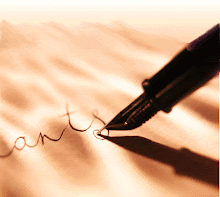The results are often quite similar and predictable too, for example, low energy generally results in cutting back on daily tasks, activities and responsibilities, the inability to make decisions or to problem solve in any meanigful manner. In turn, this starts the nasty gremlins in our heads, confirming we are indeed pathetic, weak and ineffectual, leading to depressions favourite emotion: Guilt. It all seems so hopeless, like you won't ever be able to break out of it. It will just feed and feed on itself until it seems like it will consume you whole, and there is no other way out.
On top of the behavioural things, you are also fighting against a chemical warfare being waged on your brain. The three big guys that will either keep the boat afloat, or send it plummeting to the ocean floor are seretonin, dopamine and norepinepherine. Seretonin and norepinepherine are the two major players, they can work independently or together to bring you down. (Hence some people respond best to SSRIs - Seretonin Uptake Inhibitors and others to Tricyclic Antidepressants which will fight when the two of them are working in cahoots. Dopamine is kind of like a fair weather friend, who will only work well for you when reinforced, but will drop you in a red hot minute when lacking reinforcement (such as activity). Obviously if you get caught in the Behavoural cycle of depression (see above) Dopamine isn't getting what he wants from you, and deserts, leaving you feeling even worse. (Much like some of the real fair weather people in your life, huh?) Worst still some of the things Dopamine likes to feed off are actually really bad for us (drugs, alcohol....chocolate :P )
So there you go, Ophelia's really simplistic understanding of the enemy. Now how to start fighting?








That's true as far as it goes, but it doesn't go very far. It's more useful to ask what depression is for — why is it that we have a depression mechanism in our brains at all?
ReplyDeleteA reasonable answer is that depression keeps us from being very active, and therefore keeps us safe, when we have other things on our minds — a major readjustment to make, or a major problem to solve.
That's why CBT is such a widely recommended treatment. CBT goes looking for the underlying readjustment or unsolved problem, and fixes it directly. Then there's no longer any need for depression, and the depression just goes away.
CBT is so dramatically successful that the name "CBT" has been hijacked by many charlatans who teach techniques that have almost no value. But conventional CBT, the real CBT, recognizes depression as a natural protective mechanism, and treats the underlying causes.
how do you differentiate between the 'real' CBT and the charlatan 'CBT'? Just interested to know?
ReplyDeleteWhat I've said here, basically. If it's just about techniques for you to use on yourself, it's not really CBT. If it's about discovering what really happened to make you depressed in the first place, then it very likely is CBT. There are more details in my blog, and in the original books by the discoverer of CBT, Aaron T. Beck.
ReplyDelete